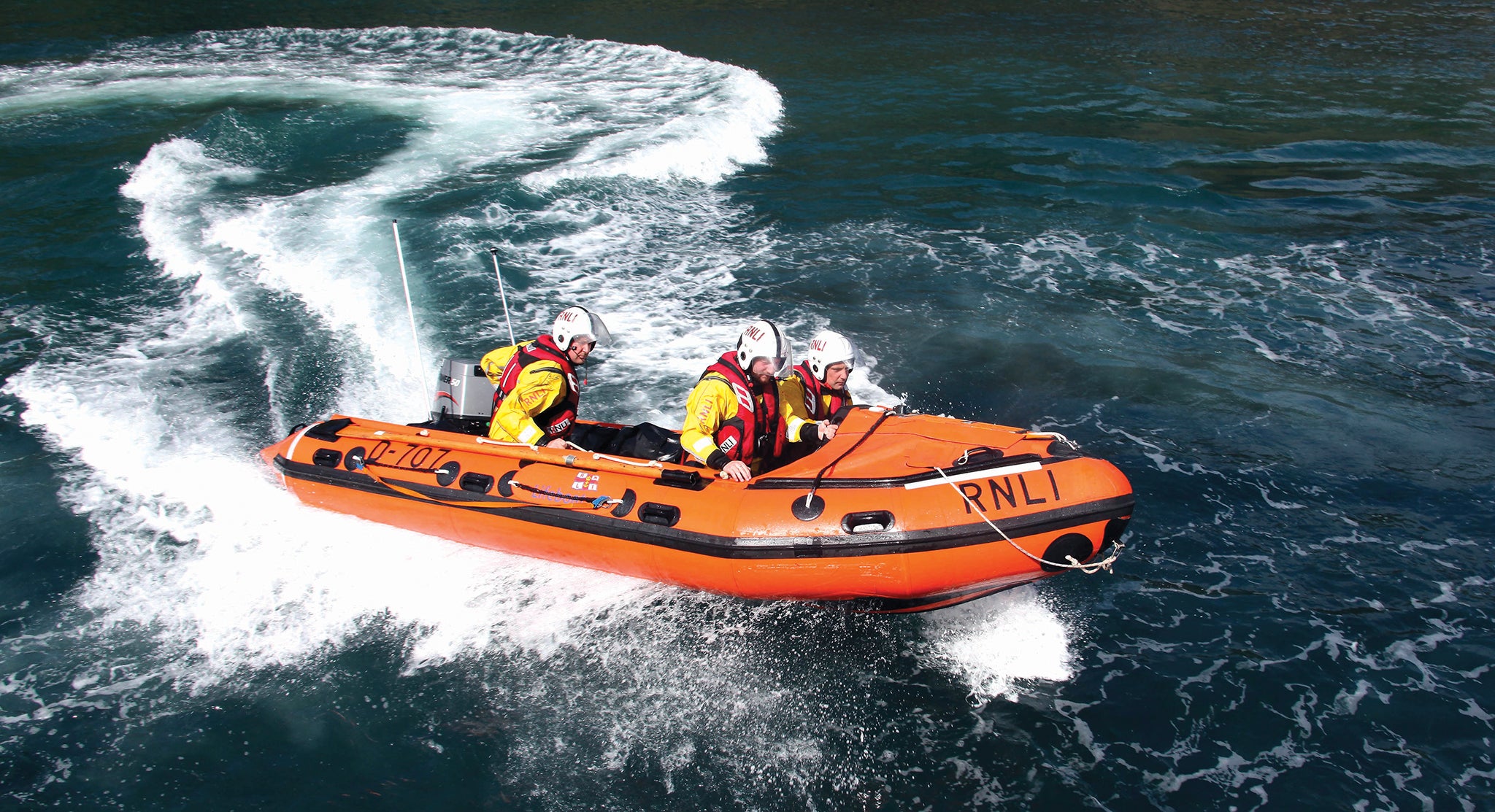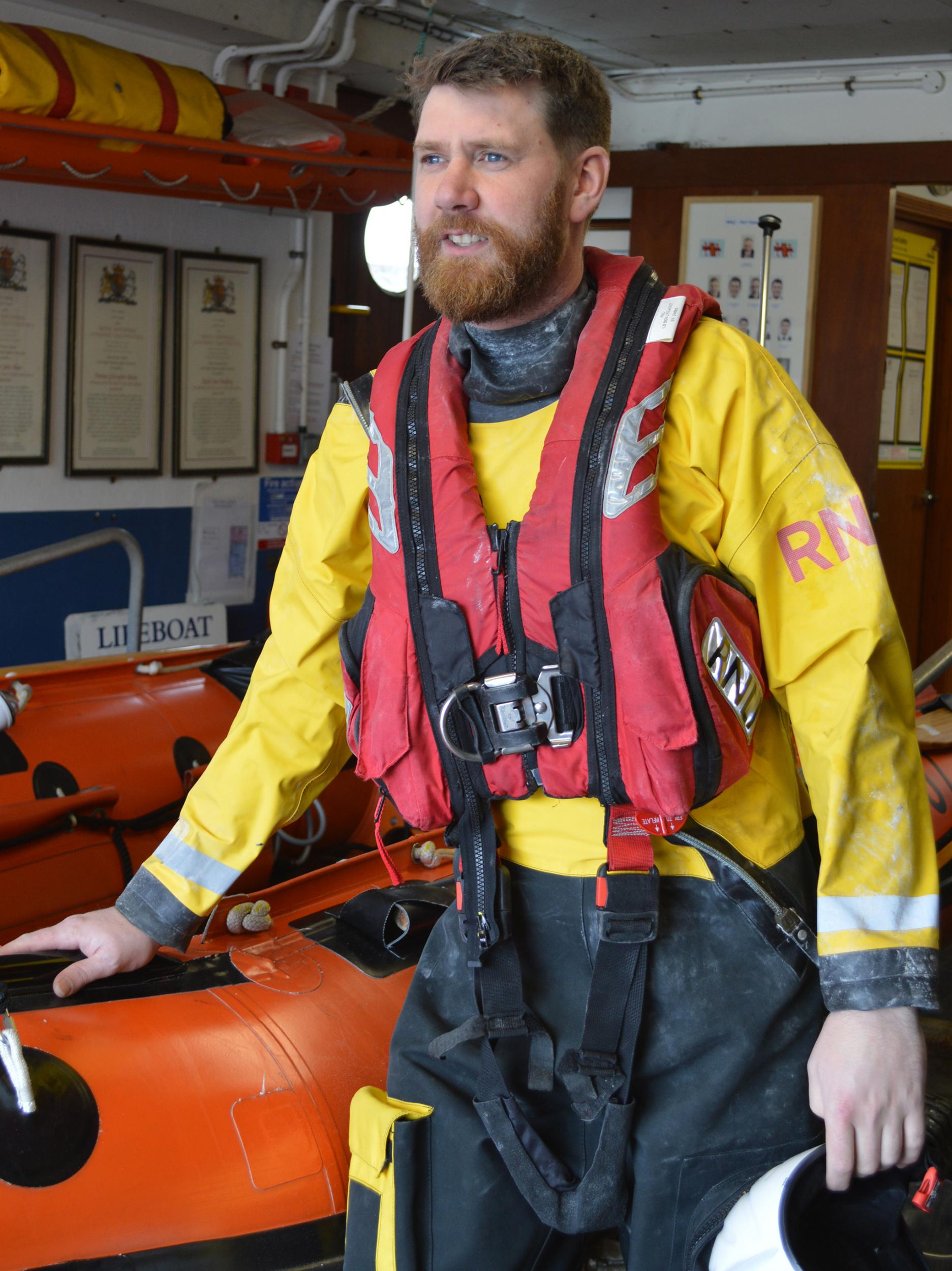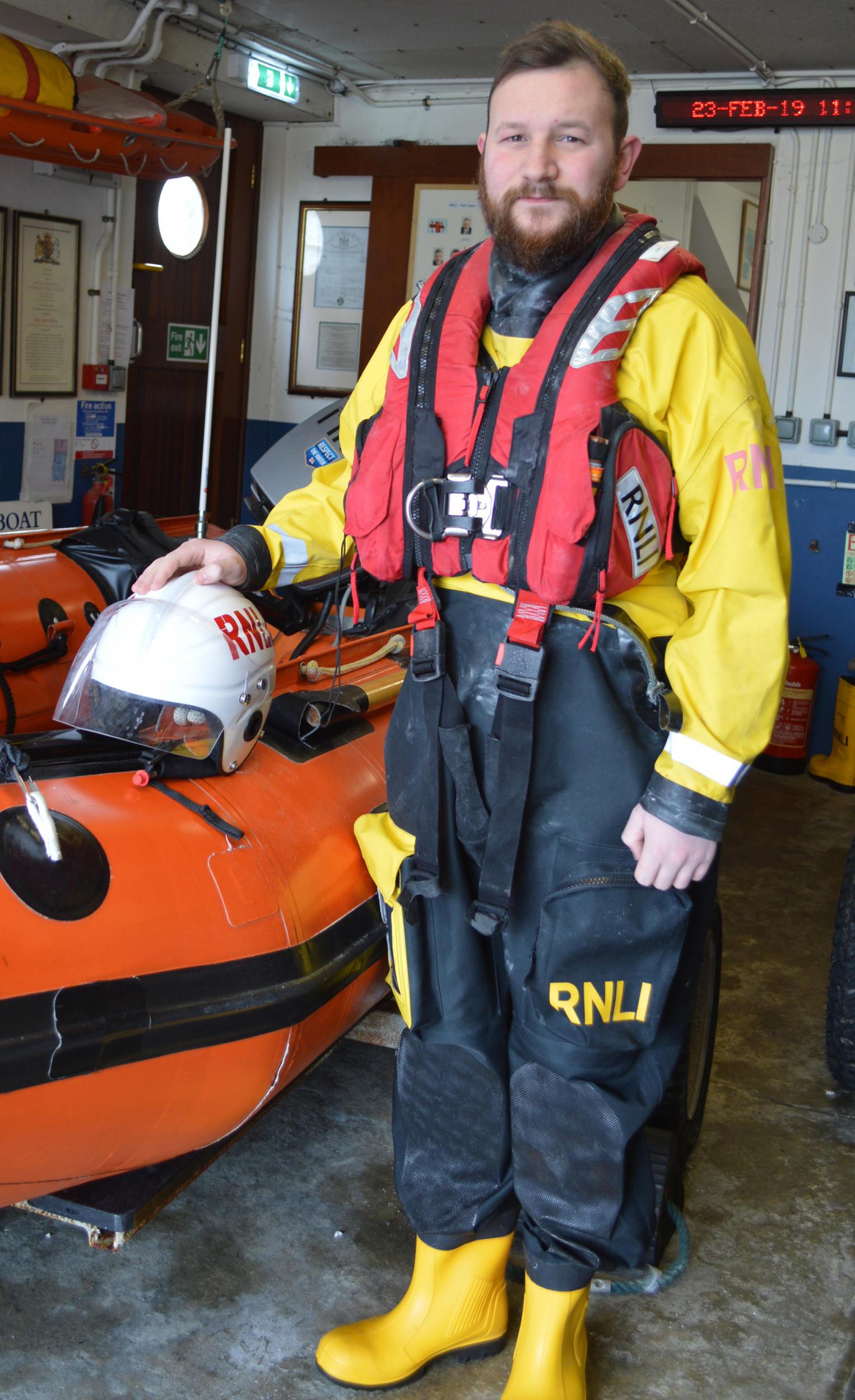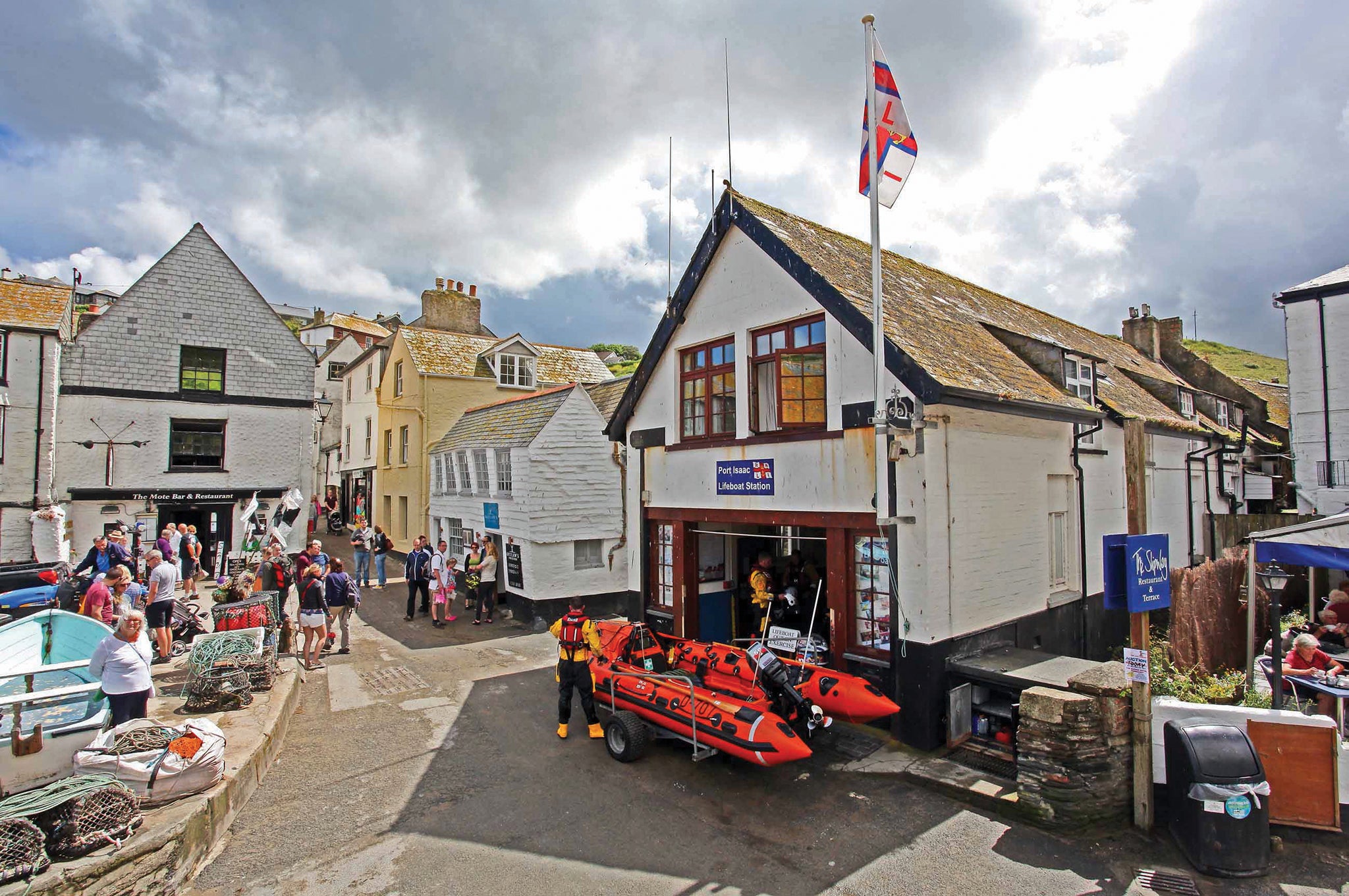
Visiting Port Isaac – tucked away on the rugged north Cornwall coast – in early March, the weather can only be described, at best, as grim. Low-lying cloud clings to the huge sea cliffs and, out at sea, a big swell batters the coast. The harbour lies empty. Instead, the boats are tucked away in the safety of Padstow harbour. Tourists mill around, watching the waves, perusing the gift shops and galleries and taking refuge in cafes and coffee shops around the village.
The scene is a world away from the blue skies, bright sunshine and glass-like seas shown in the recently released film Fisherman’s Friends, which was both set and filmed in Port Isaac. It tells the heart-warming and true story of a group of Cornish fishermen – the Fisherman’s Friends – who signed to a major record label against all the odds.
In addition to the shanties and nautical-themed gags, the film shows that many of the group worked as volunteer lifeboat crew members at the RNLI’s Port Isaac Lifeboat Station. In one key scene, several members of the band get called away from one of the most important gigs of their careers to launch the lifeboat on a rescue mission.
In total, five members of the real band were RNLI volunteers in varying capacities and, today, their sons are following in their footsteps. Two of whom are George Cleave and Tom Brown, whose fathers, Jon and Jeremy, are still Fisherman’s Friends singers.
I meet Brown and Cleave in the lifeboat station, tucked away in the historic core of the village just yards from the sea. They’re fresh back from the premiere of the film in Newquay and are extremely pleased with the finished product, especially the portrayal of their father’s ventures as well as the work of the RNLI.
“It was really refreshing to see a film about Port Isaac and it having been filmed here and keeping the name,” says Brown, “and, also, the big connection with the lifeboat. I hadn’t realised there was so much about the RNLI in there. It comes across really well, not too cheesy or heroic.”

Local boys with their own business linked to the sea and with family connections to the Port Isaac lifeboat, there was a certain inevitability that they too would sign up. “If you’re one of the local lads,” explains Cleave, “it’s kind of expected that, if you’re working in and around the village, you join the crew. It’s only a small village so there aren’t loads of people that could go on the boat – if you’re here you might as well be part of it.” Cleave laughs as he explains how he joined the crew. “Someone will approach you,” he says, “and have a word saying that if you’re sticking around it will be a good idea to join the crew. Then they’ll just nag at you until you join, at least they did with me. It’s good though, and I’m really glad I did it.”

He’s been on the crew for just over three years, while Brown, a commercial fisherman and skipper of his own boat, has been on the crew for 13, practically since he was old enough to join. “I don’t think they wanted me to join really,” he jokes. “Being a fisherman they think I’ve got bad habits. Being at sea with my job meant I might be able to bring something to the crew in terms of my knowledge of the sea and of the local area. A mate joined at the same time and he made me feel guilty for not joining, so I joined up too.”
Although they operate the RNLI’s smallest lifeboat, the inflatable D-class, Cleave is full of praise for its ability… if not its comfort. “We’ve been out in some big stuff with our boat, the Copeland Bell. It’s such a versatile and tough little boat. There’s absolutely no comfort whatsoever, but we can get right in close to the shore where the bigger boats can’t get.” Despite the harsh conditions they face, he certainly doesn’t seem to be too worried about their ability to come through unscathed. “Even when it’s really, really rough,” he says, “you still have massive faith and confidence in your equipment as well as the protective clothing you’ve got on. On top of that, you have huge belief in the other crew members around you. You’re all working together, relying on each other and really working as a team.”
If the conditions on the day I visit are anything to go by, and the size of the swell breaking over the craggy rocks and headlands is an indication of how rough it can get, they have a very exposed section of coast to cover. “Our patch is a really big area,” says Brown. “It goes right up towards Bude and it can be horrendous if the sea is rough and the wind is in a certain direction. There are big, big cliffs and only a few places where you can get down to the coast. It can take us up to an hour to get to the furthest part of our patch, and that’s on a calm, flat day.”
The nature of the calls they attend is varied and continues to change with time. With more people heading to the coastline and an increase in the availability, and affordability, of paddle boards, surfboards and kayaks, the number of leisure-related calls has slowly increased. “A big thing over the last few years,” says Cleave, “has been the number of dogs off leads going over cliff edges. The danger is, because people love their dogs so much, they’ll try and get down to rescue them and then they get into difficulty.”

Thanks to increased publicity and advertising campaigns from the RNLI, as well as the huge popularity of the BBC’s Saving Lives at Sea series, more people are thinking twice about what they do when they’re at the coast. That said, incidents involving dogs continue to be a semi-regular fixture for the Port Isaac crew. “Probably the worst weather I’ve been out in,” says Brown, “was for a dog. The Padstow crew were also out. The waves coming in were the size of houses and we were out there for four hours because we just didn’t know if the owner had gone in, too, looking for the dog.”
The beautiful north Cornish cliffs have a brutal side. Those who fall from them have very little chance of survival. “Unfortunately, we get people that decide to purposefully go off the cliffs to end their life. So we’ve had a number of shouts to recover bodies, which really isn’t a great experience but at least you’re bringing the body back for the family and giving them closure. I think the first time I did it I was only 19 and that was quite an experience. That’s where it’s important that the crew all support each other.”
RNLI facts
1. The Royal National Lifeboat Institution (RNLI) is nearly 200 years old, having been founded in 1824. Since its inception it has saved more than 140,000 lives
2. In 2017 the lifeboats of the RNLI launched 8,436 times. That’s an average of 23 launches a day, every single day of the year
3. Lifeboats are requested to launch by the Maritime and Coastguard Agency, a government body that is responsible for the initiation and coordination of search-and-rescue operations in UK waters
4. The RNLI operates more than 240 lifeguard units on UK and Channel Islands beaches and responded to more than 15,000 incidents in 2017
5. The running cost for the RNLI in 2017 was almost £180m, or, approximately, £485,000 every single day
6. As a charity, 94 per cent of the RNLI’s total income comes from donations and so its lifesaving service relies on the kindness and generosity of its supporters and its 23,000 volunteer community fundraisers
7. A D-class inshore lifeboat costs £52,000 whilst the most modern vessel in the fleet, the Shannon-class all-weather lifeboat, costs more than £2M
8. There are 4,966 volunteer crew members and a further 1,217 volunteer shore crew members helping to launch and recover lifeboats
9. There are 620 female crew members, up from 313 in 2013. Ninety-five per cent of all RNLI people are volunteers
10. Only one in 10 RNLI volunteer crew members comes from a maritime profession, so training is essential. Every year this training costs, on average, £1,600 per crew member
Not every callout ends in sadness, though, and, in addition to minor emergencies – such as when a boat may require a tow back to harbour – sometimes the crew save a life. Brown describes one such call off Boscastle. “It was a rough old day,” he remembers, “and I’d been at sea all day working. We’d just got back and were sorting the catch out when the pagers went off saying there was a kayaker in trouble.” He knew the conditions the kayaker was facing. “The way the wind was blowing,” he says, “there was no shelter or protection for her and when we went up there she was clinging on to the kayak. The wind was taking her away from the rocks and she would have been a goner if we hadn’t got there. Knowing you’ve not just helped someone but actually saved their life is an amazing feeling.”
Getting back from a successful rescue doesn’t necessarily mean there’s a spring in your step, as Cleave testifies. “If it’s been rough out there and you’ve been out there for several hours, you get back and you feel like you’ve been beaten up and you’re walking around like an old man, but there’s a huge adrenalin rush afterwards and you can’t sleep because it’s all replaying in your head.
The tales they tell range from the deadly serious to the enjoyable. Sometimes a member of the public has phoned in with good intentions only for the crew to discover no emergency at all. There are genuine accidents and incidents that could have been avoided. Other times, it’s a question of luck and being in the right place at the right time. “We had a memorable shout,” says Brown, “when we were out on exercise. We were just out training when a shout came in. A boat had capsized about a mile off shore and there were four people clinging to it, including a young child, and they weren’t all wearing their life jackets. It was just luck that we were passing at the right time.”
Regardless of the nature of the callout, every single one is treated with the same level of commitment, professionalism and selflessness that is synonymous with the RNLI. Brown, as a family man with two young children, as well as his own business, has had his fair share of interruptions and disturbances when the pager sounds, but just accepts it as part of the job. Cleave is equally as philosophical. With a recently established fishmonger business, and with his place of work a matter of feet from the lifeboat station and the harbour, he’s well aware of the fact that if he’s not working he’s not earning, but the rescue missions definitely put that into perspective. “We’re on call all the time,” he says, “24 hours a day, every day of the year, and if we’re needed, we’re needed. Obviously we’ve all got our jobs and businesses, which are really important. Sometimes you’ve got a really busy day ahead of you and you’re just getting stuck into it when the pagers go off. We go, of course we go. If someone’s drowning that really puts things into context.”

Some shouts, however, could have been avoided completely. Sometimes situations don’t quite match up to the phone call made by members of the public, says Cleave. “We treat every shout seriously, obviously. The story can change all the time. What you’re told initially and what you actually find can be worlds apart. You’ll have a call saying someone has fallen down a cliff and really badly injured themselves and then you get there and he’s limping across the beach and he’s actually OK. I do think, though, that the vast majority of calls are really well-meaning and it’s far, far better to be safe than sorry.”
While the crew believe in their equipment and ability, there are still serious risks, and it can be hard for those left back on the shore. “With a family and two young children, it’s inevitable that there’s an element of worry for my wife, especially when we have shouts at night,” says Brown. “She’ll phone the station for any updates or she can track the boat’s route on the internet and see where we are. That said, she totally understands that it’s what we’ve got to do as part of a small, coastal community.”
Despite the disturbance to their daily lives, work and families, there’s no doubt in the minds of the crew that they must attend every call. So why do they do it? “It’s a great thing to be involved with and it’s putting something back into the community,” says Brown. “We’re just normal people. You go to work and if you get a shout, you get a shout. You just do what anyone else would do in that situation: help others.”







